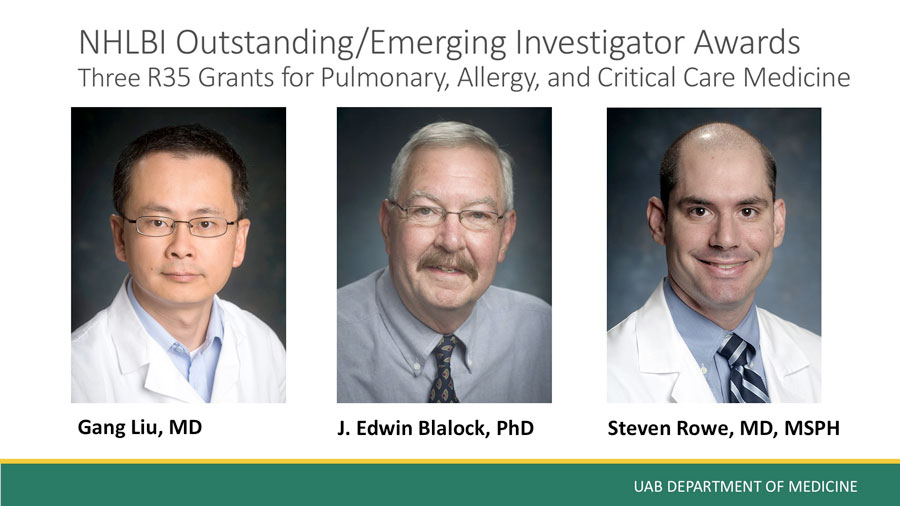 Three investigators from the Division of Pulmonary, Allergy and Critical Care Medicine, part of the Department of Medicine at the University of Alabama at Birmingham, have received R35 grants from the National Heart, Lung and Blood Institute, part of the National Institutes of Health. The R35 grant program is a new funding mechanism that is designed to support research programs, rather than a single research project.
Three investigators from the Division of Pulmonary, Allergy and Critical Care Medicine, part of the Department of Medicine at the University of Alabama at Birmingham, have received R35 grants from the National Heart, Lung and Blood Institute, part of the National Institutes of Health. The R35 grant program is a new funding mechanism that is designed to support research programs, rather than a single research project.
“It is extraordinary for three investigators from one university, all from the same division, to receive these grants,” said Victor J. Thannickal, M.D., director of the Division of Pulmonary, Allergy and Critical Care Medicine. “It is indicative of the quality and breadth of UAB research in lung disease. The R35 grant program marks a new initiative in research funding, providing investigators increased freedom to conduct research that breaks new ground or extends previous discoveries in new directions.”
|
“It is extraordinary for three investigators from one university, all from the same division, to receive these grants. It is indicative of the quality and breadth of UAB research in lung disease. The R35 grant program marks a new initiative in research funding, providing investigators increased freedom to conduct research that breaks new ground or extends previous discoveries in new directions.” —Victor J. Thannickal, M.D. |
Steven Rowe, M.D., professor of medicine, Nancy R. and Eugene C. Gwaltney Family Endowed Chair in Medical research, and director of the Gregory Fleming James Cystic Fibrosis Research Center, received an Emerging Investigator grant of $6.5 million. Rowe’s research program will strive to make decisive advancements in the understanding of airway diseases linked to genetic and acquired CFTR dysfunction (the protein that is responsible for cystic fibrosis) and will apply that knowledge to develop new tools for their diagnosis and treatment.
“Our goal is to transform the field by answering critical questions regarding CFTR-related airway disease pathophysiology and employing innovative means for testing and monitoring responses to novel therapeutics to develop transformative treatment strategies for these disorders,” Rowe said.
J. Edwin Blalock, Ph.D., professor of medicine and Nancy E. Dunlap, M.D., Endowed Chair in Pulmonary Disease, received an Outstanding Investigator award of $6.14 million. Blalock’s laboratory has identified a novel biomarker for a number of pulmonary diseases, including COPD, cystic fibrosis and ARDS.
“This work describes a new pathological entity, the proteolytic exosome, which is a small structure within a cell,” Blalock said. “In diseases such as COPD, this type of exosome drives chronic inflammation and tissue damage. A complete understanding of the proteolytic exosome may lead to new diagnostics and therapeutics for chronic inflammatory diseases such as COPD.”
Gang Liu, M.D., associate professor of medicine, received an Emerging Investigator grant of $5.2 million. Liu’s research program will center on the role of pulmonary metabolic dysregulation in the cause and development of lung fibrosis.
“The studies proposed in this program not only should improve understanding of the participation of metabolic abnormalities of different types of pulmonary cells in progression of lung fibrosis, but also are likely to provide solid groundwork for translating metabolic approaches into effective lung fibrosis therapies,” Liu said.
According to the NIH, the goal of the NHLBI R35 Program is to promote scientific productivity and innovation by providing long-term support and increased flexibility to experienced and emerging program directors and principal investigators conducting heart, lung, blood and sleep research.